By Bradley Bush on SwimSwam
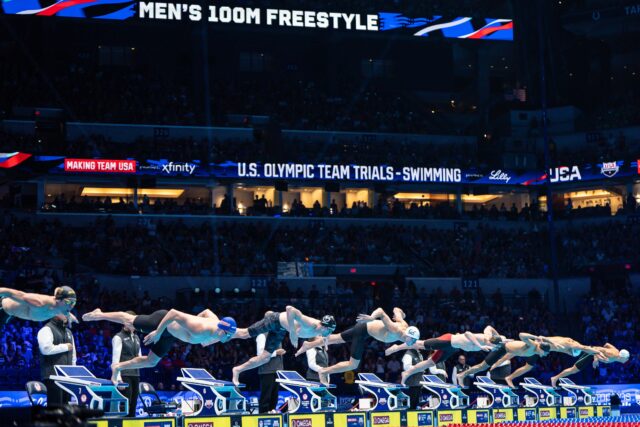
We all see the swimmers with the three fastest reaction times in each heat immediately following the start of every race. Do these less-than-a-second times have any true effect on the outcome of a race?
After hearing Rowdy Gaines give Gretchen Walsh grief for her reaction times for nearly every major broadcast in the past few years (and Walsh continually showing that a slow reaction time can be easily overcome), I decided to look a little further into the numbers, analyzing if a fast reaction has any effect on the outcome of a race. Is there any way these times, barely over half a second, can influence who gets to travel to Paris this summer?
The reaction time is a chance for swimmers to showcase their explosiveness and quick responses to stimuli. On a non-backstroke start, reaction times are measured beginning with the start signal and ending when the swimmer’s feet leave the block. From Omega Timing’s website:
In this year’s finals, reaction times were definitively faster in the four backstroke events, due to a backstroke start being different from the other four disciplines, in which swimmers propel themselves off of a wedge instead of diving off a block.
The fastest reaction times were typically under 0.55 seconds for backstroke events, and under 0.60 seconds for non-backstroke events.
Reactions tended to be faster among sprint events than distance events, and marginally faster among men than women.
Oddly enough, the only non-backstroke, sub-0.55 second reaction times both came from the women’s 1500 freestyle, from Paige Downey (0.53) in prelims and Katie Grimes (0.54) in finals.
Events in which the initial underwaters (directly off the start) have more of an impact (50/100 free, 100 fly, 200 IM) tended to have faster reaction times across both genders. Freestyle events longer than 200 meters (events in which the start doesn’t influence a race nearly as heavily) tended to be among the slower events for both genders as well.
The average reaction time across all men’s finalists was 0.653 seconds, and the average for women was 0.678 seconds. The average reaction time across all finalists was 0.666 seconds.
For every swimmer who earned an Olympic berth in their event with the fastest reaction time in their heat, there are nearly as many swimmers who earned their spot with the slowest reaction time in their heat.
The following swimmers all had the fastest reaction time in their respective finals:
- Lilly King (200 BR)
- Kate Douglass (100 FR/200 BR)
- Regan Smith (200 BK)
- Katie Grimes (1500 FR)
- Katie Ledecky (800 FR)
- Paige Madden (400 FR)
- Ryan Murphy (100/200 BK)
- Chris Giuliano (100/200 FR)
- Charlie Swanson (100 BR)
- Carson Foster (400 IM)
- Aaron Shackell (400 FR)
And the following swimmers (who will all be competing in these events in Paris!) had the slowest reaction times in their finals:
- Gretchen Walsh (50 FR/100 FL)
- Alex Walsh (200 IM)
- Katharine Berkoff (100 BK)
- Phoebe Bacon (200 BK)
- Emma Weyant (400 IM)
- Jack Alexy (100 FR)
- Luke Hobson (200 FR)
- Bobby Finke (800 FR)
As we saw with Hunter Armstrong’s 100 backstroke semifinal performance, there is so much more to a race than the start. This data further enunciates the idea that, while a fast reaction time can aid your race, it’s never going to be a dealbreaker. Like underwaters, turns, and stroke rate, reaction time is just another part of the sport that allows some swimmers to excel and lets others showcase their talents during other parts of their race. While this particular part didn’t have a grand impact on the outcome of any events at Trials, it can still be interesting to analyze the data.
NOTEWORTHY REACTION TIMES
Ryan Murphy had the fastest reaction amongst all finalists, with a time of 0.51 seconds in the finals of the men’s 100 backstroke. Murphy also boasted times below 0.60 seconds in all three (prelims/semis/finals) of the 100 butterfly, as well as below 0.55 seconds in all six of his backstroke swims. Piper Enge, Lilla Bognar, Leah Smith, Daniel Baltes, and Bella Sims each had three or more swims with reaction times under 0.60 seconds. Alongside Murphy, Ben Irwin featured three backstroke swims with reaction times under 0.55 seconds.
Fastest Reaction Times (Women’s Backstroke)
- Hailey Weiler (0.49, 100 Back Prelims, fastest reaction time of the meet)
- Audrey Derivaux (0.52, 100 Back Prelims)
- Kacey McKenna (0.53, 100 Back Prelims)
- Summer Stanfield (0.53, 200 Back Prelims)
- Claire Curzan (0.54, 100 Back Semis) / Leah Shackley (0.54, 100 Back Prelims)
Fastest Reaction Times (Men’s Backstroke)
- Shaine Casas (0.50, 100 Back Prelims)
- Ryan Murphy (0.51, 100 Back Semis)
- Ryan Murphy (0.51, 100 Back Finals)
- Shaine Casas (0.51, 100 Back Semis)
- Ben Irwin (0.52, 100 Back Prelims)
- JT Ewing (0.52, 100 Back Prelims)
- Michael Long (0.52, 200 Back Prelims)
- Mitchell Norton (0.52, 200 Back Prelims)
- Ryan Murphy (0.52, 100 Back Prelims)
- Will Modglin (0.52, 100 Back Semis)
Fastest Reaction Times (Women’s Non-Backstroke)
- Paige Downey (0.53, 1500 Free Prelims)
- Katie Grimes (0.54, 1500 Free Finals)
- Bella Sims (0.55, 100 Free Prelims)
- Bella Sims (0.55, 200 Free Prelims)
- Camden Doane (0.55, 400 IM Prelims)
- Piper Enge (0.55, 100 Breast Prelims)
Fastest Reaction Times (Men’s Non-Backstroke)
- Lucius Brown (0.55, 50 Free Prelims)
- Noah Sech (0.55, 50 Free Prelims)
- Hudson Williams (0.56, 100 Free Prelims)
- Bryson Huey (0.57, 50 Free Prelims)
- Carter Nelson (0.57, 50 Free Prelims)
- Conner Hogan (0.57, 50 Free Prelims)
- Daniel Baltes (0.57, 50 Free Prelims)
- Nien Levy (0.57, 50 Free Prelims)
- Jeffrey Hou (0.57, 100 Breast Prelims)
- Lance Johnson (0.57, 200 IM Prelims)
- Spencer Nicholas (0.57, 200 IM Prelims)
Complete list of swimmers with notable reaction times– under 0.60 (non-backstroke) and under 0.55 (backstroke) in at least one event: Abigail Heizer, Adriano Arioti, Alex Hazlett, Andrew Zou, Audrey Derivaux, Bella Sims, Ben Irwin, Brendan Conners, Brayden Cole, Brian Benzing, Bryson Huey, Camden Doane, Carter Nelson, Chris Giuliano, Claire Curzan, Claire Newman, Conner Hogan, Daniel Baltes, David Curtiss, Dylan Felt, Ella Nelson, Gabi Brito, Hailey Weiler, Han Hoang, Henry Bethel, Hudson Williams, Jacob Molacek, Jacque Wenger, Jake Wang, Jeffrey Hou, JT Ewing, Justin Heimes, Kaiser Neverman, Kacey McKenna, Katie Grimes, Lance Johnson, Leah Shackley, Leah Smith, Lilla Bognar, Lucius Brown, Luke Walderp, Matt Driscoll, Michael Long, Mitchell Norton, Nien Levy, Noah Sech, Owen Chiles, Owen McDonald, Paige Downey, Patrick Colwell, Piper Enge, Rob McCall, Ryan Murphy, Shaine Casas, Sean Sullivan, Spencer Nicholas, Summer Stanfield, Tim Gallagher, Tommy Janton, Torri Huske, Will Modglin

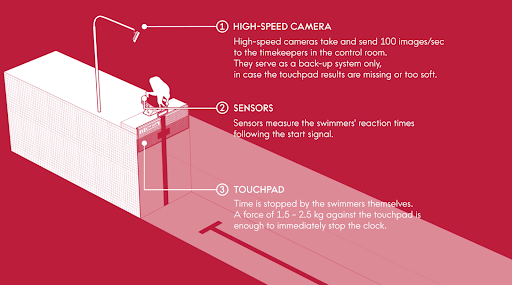
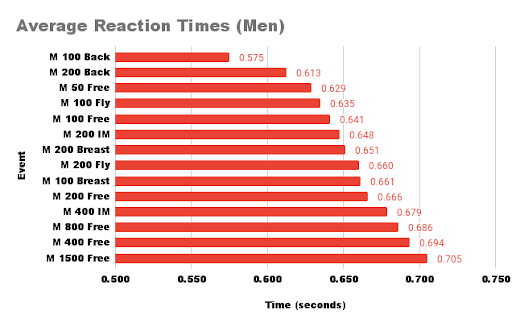
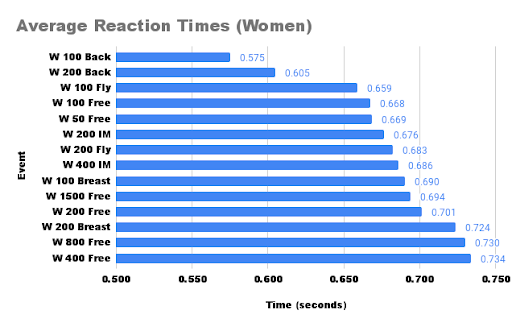
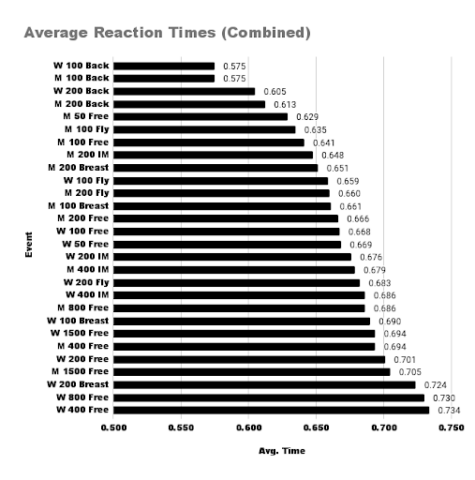










You must be logged in to post a comment Login